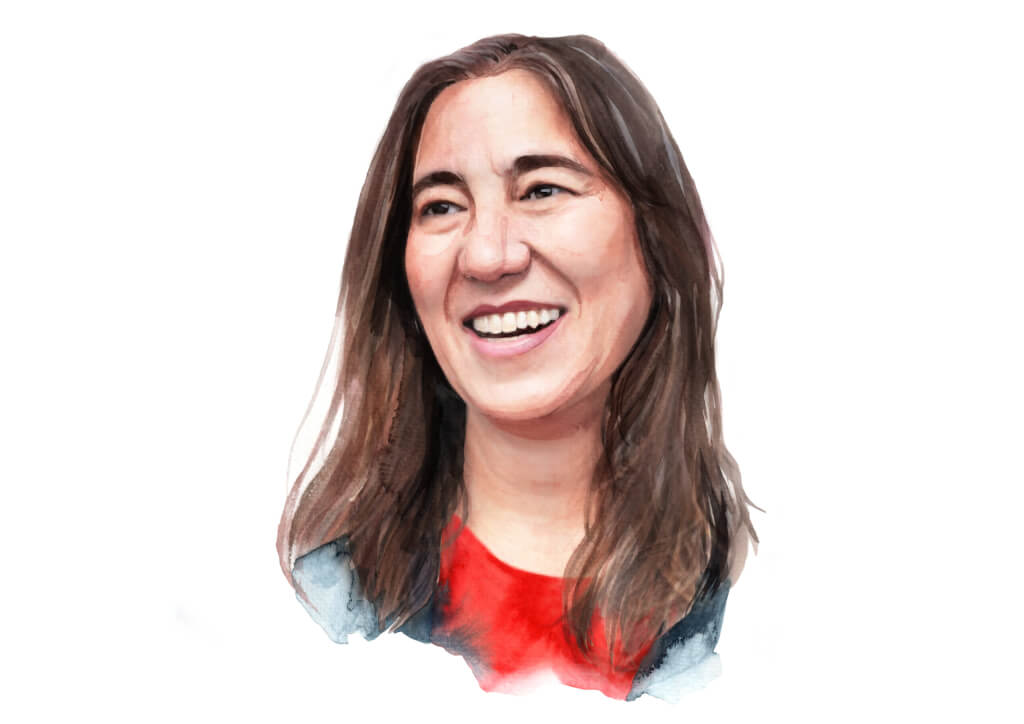Ariane Bertrand Director – Thriving Communities at Emerson Collective

Ariane Bertrand is a wonderful person. I’m not accusing her of perfection or putting the burden of sainthood on her shoulders, but goodness shines through when one speaks with her. She is friendly, open, generous, funny, and delightful. What I found impressive and unique, however, was that from quite an early age, Ariane wanted to make a positive impact and difference for others and the world around her – and I’m not speaking figuratively. Ariane’s life is devoted to sustainable, healthy ecosystems.
Currently, Ariane serves as Director of Thriving Communities at Emerson Collective in Palo Alto, California, where she has worked for the past ten years. Emerson Collective is a philanthropic organization that aims to create “…a world where every individual has access to opportunity, health, and well-being. Focusing on creating pathways to genuine opportunity so people from all communities can achieve their full potential.” As Ariane describes it, the Collective “is not a traditional philanthropy. It’s both nonprofit investing and for-profit investing, so it’s an LLC. They have many options of what they can do, what tools they can use.”
When she began at Emerson Collective, the work was done by a handful of people. Now, it is a philanthropic organization of about 300. Ariane’s work has been part of their incredible growth. Yet when she talks about her achievements, she’s humble and understated. “It’s not a big deal,” she says about her world-changing career and ideas.
That sounds like the talk of a classic perfectionist! And it’s true. Raised by parents with PhDs who taught at Stanford, Ariane was mortified to even bring home a “B” on a report card.
Early Life
Ariane’s father was French and immigrated to study at Berkeley; her mother was born in Iran, raised in Monaco, and later moved to study at Stanford. There, Ariane’s parents met. Stanford remained their home for much of Ariane’s childhood, although her father, an expert in French culture, often accompanied students on the French exchange program. Thus, Ariane spent several of her elementary and high school years in French schools. As immigrants and college professors, Ariane’s parents set solid examples for the importance of excellence in education.
Despite her parents’ focus on the humanities, Ariane always liked science. “I wanted to know how things worked. I usually took my toys apart. I experimented with the natural world. And though my parents weren’t focused on science, they were curious and engaging people. I know I got my love of learning from them.”
Ariane excelled in school and played lots of sports. Her parents expected her to get excellent grades. It was assumed she would to college and probably also graduate school. Still, Ariane had yet to have a direction to take. She thought about being a professor as a career, because she had always loved teaching, but didn’t know what she would get her PhD in.
Despite excellent grades and plenty of sports and extracurricular participation, Ariane was surprised to receive few acceptances in the highly competitive Ivy League colleges she desired. Though her options for college seemed limited, she is now glad to have attended the University of California Davis, which had a fantastic environmental science program that caught her interest at once, a major called Environmental Biology and Management. “Although,” remarks Ariane, “environmental science at the time was very science-focused. It now also encompasses communities, environmental and social justice, and people, in addition to science. It has grown so much, and people are much more aware.”
Though interested in science and how things worked, Ariane knew she didn’t want to be in a lab. She wanted a major that related to the larger world and could be of service to the world. She knew that many problems were on the horizon, and she wanted to prepare to help somehow.
In college, Ariane worked as the student advisor for her major and gave tour guides to new students. She also did some field research and required lab work, which she is only too happy to joke about. “I classified soil samples. It just wasn’t for me.”
After graduation, Ariane knew she wanted to go to graduate school. She had done an undergraduate science-based major because she wanted to understand the questions-and-answers foundation for environmental science. Now, she understood the systems environmental science dealt with. But what was missing, she felt, was the community and people.
Ariane recalls, “Jobs in environmental science at the time were very specific – people would focus on the ecology of a particular habitat or animal. I was more interested in ecosystem ecology.” Therefore, she aimed for graduate school to show her how to be the “translator,” who helped people who weren’t in the environmental field understand what was happening around them. She did her masters in environmental policy and economics.
Ariane attended graduate school at Boston University. The program required her to either do a thesis or an internship/paper assignment. To her, the latter was the more exciting option. She got an internship at the Massachusetts Department of Environmental Protection in their Environmental Justice Division, which allowed her to take some environmental justice classes at Tufts. She wrote her paper on the experience of working there, where she got to help build an information system within the department that distributed environmental information in multiple languages. “That project helped me think about the intersection of community justice and the environment, what certain communities have experienced, and how so many of our systems are built on oppression and built to the disadvantage of certain people.”
Graduation and Adult Working Life
Once she finished graduate school, Ariane returned to live with her parents on the Stanford campus. She took a few short-term jobs, such as studying watersheds with the Coyote Creek Riparian Station, and even went on a humanitarian mission to the Ivory Coast.
Eventually, Ariane got a job at the Peninsula Open Space Trust (POST) as the Land Manager. POST retains the right to development on properties it owns so that people can purchase that land at a far lower price, but they cannot actually “change” it. POST monitors conservation easements to ensure that the land’s health is maintained. Ariane also worked on transitioning some of the properties to open space agencies to turn them into parks and public access.
But she ran into a frustrating difficulty. “At POST, I was a young woman, and I looked even younger. And I found it challenging; I constantly had to prove I knew what I was talking about. I got tired of that.”
Ariane changed jobs to another organization called College Track, which helped students of color, who are often the first generation in their families, to get into college. “I loved working with youth. And these first-gen students and students of color didn’t always have access to the necessary information or networks of people. Because it’s just how things still operate, the right connections got a lot of successful people where they are. College Track was that connection for the students who needed it.”
After having her two children, Ariane took several years away from work to raise them. She explains, “When I had my kids, I wanted to be home with them. I felt it was my responsibility to be there for them.”
“For me, it was never about this notion of success; I never wanted to be in a certain role. I just wanted to know I was making a difference and being of service. I don’t care if I’m the director or the executive. Honestly, those things take so much time and limit your ability to be on the ground or spend time with your family.”
“So, for me, ambition was never my career trajectory. I just wanted always to be learning and always to be contributing. And you can do that in a lot of different ways. At a certain point, I said, well, now I’m raising these kids and making sure that they have both a spiritual and an emotional foundation that will help them in their futures.”
Work at Emerson Collective
After almost ten years, Ariane felt she was ready to get back to working full-time. Perhaps because of her curious and adventurous nature, she made a pact with herself to take a year where she pursued and accepted any opportunity that came her way.
In that spirit, Ariane ran into an old friend who helped connect her with Emerson Collective, which was still in its early stages. Ariane started working within the food space, looking at how to ensure access to nutritious food, and eventually, she built the Environmental Justice and Food Access Portfolio. Ariane also got to participate in the early stages to help build what grant-making would look like in Emerson’s philanthropic space.
Ariane explains, “We try to support the organizations holistically and do whatever we can. And we know them well.” Ariane emphasizes that, adding, “I must do all the diligence. They’re not applying for grants; I’m reaching out to them. So it allows for a kind of philanthropy that is more effective and relationship-based. We focus on how we can best serve the organizations.”
“There are a lot of environmental organizations out there. We call them grass-top organizations. World Wildlife Fund, Sierra Club – you know, basically the ones people know about. They do bigger picture work and,” Ariane laughs, “tend to be run by white men. I always wanted to do something more targeted and community-based. Something that takes on more risk.”
After six years of being in philanthropy, the always-curious Ariane began wanting something new. “I wasn’t learning new things at that point. I felt I had done good work, but I had more to give and wanted to learn how to do new things. But the organization was fairly flat.” That meant there weren’t any promotions to seek. However, Ariane didn’t want more power or to move up a ladder. “That often is just more administrative and further away from the actual work. But, since I had worked in East Palo Alto, and we had this new project there, I asked if I could transition to that.”
The Collective owns 52 acres of land in East Palo Alto. “We are not a commercial real estate development company; we are a social justice organization. The question was, can you use development as a positive tool for community development and minimize displacement? So for the last four years, I’ve been running our community side of things, listening to community members, building trust, and working to co-create the project with them.”
When asked what she would communicate to her ten-year-old self, Ariane says, “You have to learn to be adaptable and flexible. Your plans will always be different than what you expect. Fundamentally, understand what your values and principles are. You may take many paths, but you must have your values to maintain your integrity and make the right choices despite the noise and distractions. You’ll eventually end up where you’re meant to go, and you’ll learn along the way.”
Ariane has a wonderful attitude about the inevitability of success as long as one’s strong values are in place, and she remains devoted to learning, curiosity, and the betterment of our world. “To this day, I’m curious about the interconnections and collaborations of things. I can’t claim to be an expert in anything, but I like to see how systems work, and then I like to bring them together. I don’t know; what does that make me?”
To us, it makes you a truly wonderful person, Ariane!
To learn more about Emerson Collevtive’s work in East Palo Alto, check out this link.
